
7 Best Moisturizers for Dry Skin To Buy In 2023

Dry skin can be a year-round predicament, often requiring a robust moisturizer to alleviate discomfort and flakiness. To help you navigate the plethora of options, we’ve compiled a list of the 7 best moisturizers designed to combat dry skin, each bringing its unique blend of hydrating heroes to the table.
7 Best Moisturizers for Dry Skin
1. CeraVe Moisturizing Cream
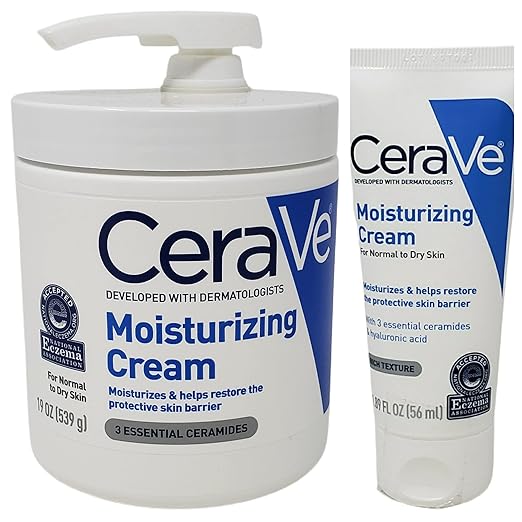
CeraVe’s Moisturizing Cream is a dermatologist-favorite that is formulated with essential ceramides and hyaluronic acid to effectively hydrate the skin and restore its natural barrier.
Key Ingredients:
- Ceramides 1, 3, and 6-II
- Hyaluronic acid
- Glycerin
| Pros | Cons |
|---|---|
| Non-comedogenic | Might feel too heavy for oily skin types |
| Fragrance-free | |
| Suitable for sensitive skin |
2. La Roche-Posay Lipikar Balm AP+ Intense Repair Moisturizing Cream
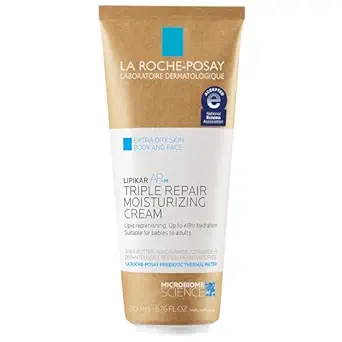
La Roche-Posay’s Lipikar Balm AP+ is designed for very dry skin, providing soothing relief and intense hydration with a non-greasy formula.
Key Ingredients:
- Shea Butter
- Niacinamide
- Glycerin
| Pros | Cons |
|---|---|
| Suitable for the whole family | Some may not prefer the thick texture |
| Fragrance-free | |
| Allergy-tested |
3. Neutrogena Hydro Boost Gel-Cream
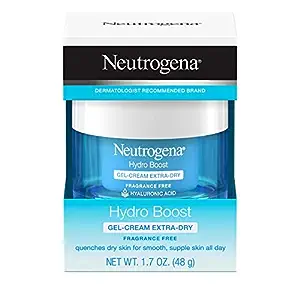
The Hydro Boost Gel-Cream by Neutrogena offers long-lasting skin hydration in a lightweight gel-cream formula that is perfect for dry skin.
Key Ingredients:
- Hyaluronic acid
- Olive extract
| Pros | Cons |
|---|---|
| Absorbs quickly into the skin | Contains dye, which might not be suitable for all skin types |
| Oil-free and non-comedogenic |
4. Olay Regenerist Micro-Sculpting Cream
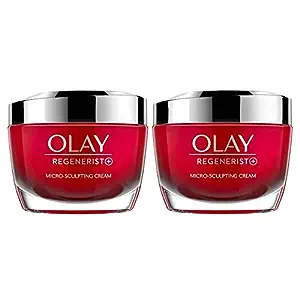
Olay’s Regenerist Micro-Sculpting Cream is not just a moisturizer; it’s a multi-purpose formula that targets dryness, wrinkles, and firmness.
Key Ingredients:
- Hyaluronic acid
- Amino-peptide complex
- Niacinamide
| Pros | Cons |
|---|---|
| Anti-aging benefits | Fragranced, which may not suit all individuals with dry skin |
| Hydrating without feeling greasy |
5. First Aid Beauty Ultra Repair Cream Intense Hydration
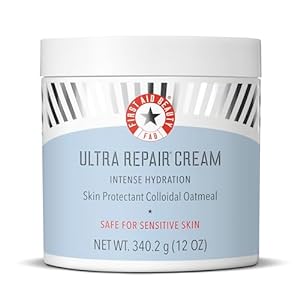
For those who prefer a clean beauty option, the First Aid Beauty Ultra Repair Cream delivers intense hydration and is suitable for even the most sensitive skin.
Key Ingredients:
- Colloidal Oatmeal
- Shea Butter
- Allantoin
| Pros | Cons |
|---|---|
| Suitable for sensitive skin | Some users may find it too thick |
| Fragrance-free | |
| Can be used from head to toe |
6. Kiehl’s Ultra Facial Cream
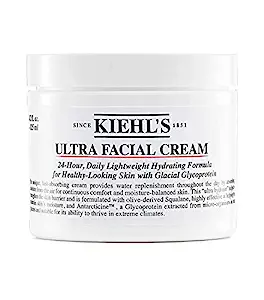
Kiehl’s Ultra Facial Cream is a well-balanced moisturizer that offers all-day hydration for even the driest skin types.
Key Ingredients:
- Squalane
- Glacial Glycoprotein
| Pros | Cons |
|---|---|
| Lightweight texture | Contains parabens, which some consumers may wish to avoid |
| 24-hour hydration |
7. Clinique Moisture Surge 72-Hour Auto-Replenishing Hydrator
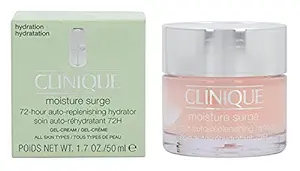
Clinique’s Moisture Surge 72-Hour Hydrator promises a full 72 hours of moisture, even after washing your face, thanks to its auto-replenishing technology.
Key Ingredients:
- Hyaluronic acid
- Activated aloe water
- Caffeine
| Pros | Cons |
|---|---|
| Gel-cream texture is cooling and refreshing | May not be rich enough for the driest skin types |
| Free from fragrances |
Important Note:
“When choosing a moisturizer for dry skin, it’s crucial to consider the formulation. Thicker creams tend to be more hydrating, but if you’re prone to acne or breakouts, look for non-comedogenic labels to avoid clogged pores.”
Frequently Asked Questions About Moisturizer for Dry Skin
What causes dry skin, and how can moisturizer help?
Dry skin can be caused by several factors, including genetics, environmental exposure (like cold, dry weather), over-washing, and aging. Moisturizers help by replenishing the skin’s natural lipids, improving its barrier function, and retaining water content.
How do I choose the right moisturizer for my dry skin?
Select a moisturizer with ingredients like hyaluronic acid, glycerin, ceramides, and natural oils. These ingredients are known for their ability to attract and retain moisture. For very dry skin, ointments and creams are preferable to lotions.
Can I use a body moisturizer on my face?
It’s not recommended to use body moisturizers on the face as they may contain ingredients that are too heavy or potentially irritating to the more sensitive skin on your face.
How often should I apply moisturizer to my dry skin?
Moisturizer should be applied at least twice a day – in the morning and at night. However, if your skin is very dry, you may need to moisturize more frequently.
Is it necessary to use a different moisturizer at night?
Night creams are often more hydrating and may contain specific ingredients that are best used at night. However, for dry skin, the main goal is to hydrate, and if your daytime moisturizer is sufficiently hydrating, you can use it at night as well.
Can moisturizers for dry skin cause acne?
Some moisturizers can be comedogenic, meaning they can clog pores, which may lead to acne. Look for non-comedogenic products, which are less likely to cause breakouts.
Are there any natural moisturizers for dry skin?
Yes, natural oils like coconut oil, shea butter, and jojoba oil are excellent for dry skin. However, they might not be suitable for all skin types, especially if you have acne-prone skin.
Do men and women need different moisturizers for dry skin?
The basic requirements for a moisturizer for dry skin are the same regardless of gender. However, men might prefer products that are less fragrant or that address post-shaving skin needs.
What is the difference between a moisturizer and a hydrator?
Moisturizers are typically formulated to create a barrier on the surface of the skin to lock in moisture, while hydrators are designed to increase the water content within the skin cells themselves.
Can I still use a moisturizer for dry skin if I have sensitive skin?
Yes, but choose a moisturizer that is fragrance-free, hypoallergenic, and specifically labeled for sensitive skin to reduce the risk of irritation.
How can I tell if my moisturizer is working?
Your skin should feel hydrated, less itchy, and more supple. Over time, you should see a decrease in flakiness, redness, and the appearance of fine lines caused by dryness.
Can I use a moisturizer with SPF for dry skin?
Yes, using a moisturizer with SPF is actually recommended to protect your skin from the sun’s harmful rays. Just ensure that it also contains hydrating ingredients suitable for dry skin.
How long does it take for a moisturizer to improve dry skin?
Some relief can often be felt immediately, but it may take a few weeks of consistent use to see significant changes in skin hydration and texture.
What should I do if my skin reacts badly to a new moisturizer?
If you experience a reaction, stop using the moisturizer immediately. If the reaction is severe or persists, consult with a dermatologist.
Remember, the key to managing dry skin is consistent care and choosing products that suit your skin’s specific needs.
Conclusion
Selecting the right moisturizer for dry skin is pivotal in achieving a balanced, hydrated complexion. The products listed above are among the best on the market, each offering unique benefits. Whether you’re looking for a cream that provides intense hydration, one that tackles additional skin concerns, or a product suitable for sensitive skin, there is an option for everyone. Remember to consider your specific skin needs and preferences, and don’t hesitate to consult with a dermatologist if you have concerns about how your skin will react to a new product. With the right moisturizer, dry skin can become a thing of the past, leaving you with a soft, supple, and radiant complexion.






